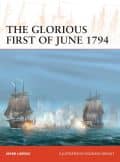AOS Naval Non-Fiction - Battles
Non-Fiction books which discuss particular fleet battles or ship engagements during the Age of Sail.

- Details
- By: Kenneth Poolman
There is no description for this book, but it is believed to be about the 1864 Battle of Cherbourg between CSS Alabama and USS Kearsarge during the American Civil War
- Title: The Alabama incident
- First Published by: William Kimber
- First Published Date: 1958

- Details
- By: Mark Lardas
- Title: The Glorious First of June 1794
- Series: Campaign
- First Published by: Osprey Publishing
- First Published Format: PB
- First Published Date: 31 October 2019
- ISBN-10: 1472834844
- ISBN-13: 978-1472834843
- Details
- By: John Barratt
|
The 200 years that separate the navy of Drake's day from that of Nelson were critical for the development of Britain's sea power, and the decade of the Commonwealth, of Cromwell's rule, is one of the turning points in the story. |
 |
- Title: Armada 1588: The Spanish Assault on England
- Series: Campaign Chronicles
- First Published by: Leo Cooper
- First Published Format: HC
- First Published Date: 20 October 2005
- ISBN-10: 1844153231
- ISBN-13: 9781844153237

- Details
- By: P. G. Rogers
- Title: The Dutch in the Medway
- First Published by: Oxford University Press
- First Published Format: HC
- First Published Date: 1970
- Details
- By: Hugh Bicheno
|
In the morning of 7 October 1571, at the mouth of the gulf between mainland Greece and the Peloponnese, the fleets of the Ottoman Empire and the Holy League clashed in the last great battle between oared fighting ships. By four o'clock that afternoon the sea was red with blood. The Muslims lost 230 out of their 277 warships and about 20,000 men. It was the first time in over a century that Christians had successfully taken the offensive against them. In this important new history, Hugh Bicheno describes the clash of cultures that led to one of the greatest turning-point battles in history, As a description of the age-old conflict between Christianity and Islam, it is a story which still resonates today. |
 |
- Title: Crescent and Cross: The Battle of Lepanto 1571
- First Published by: Orion
- First Published Format: HC
- First Published Date: 12 June 2003
- ISBN-10: 0304363197
- ISBN-13: 9780304363193
- Details
- By: Peter Padfield
|
In a series of major victories at sea against the French, the Spanish and the Dutch during the Revolutionary and Napoleonic Wars, the Royal Navy gained for Great Britain what later historians termed the ‘Empire of the Seas’, that complete dominion over the seas and oceans of the world that allowed Britain to build a world empire. This period culminating in the battle of Trafalgar, 1805, was notable for the emergence of several outstanding admirals, Howe, Jervis, Duncan and Nelson. Between them they revolutionised fleet tactics. Although very different in character, all were united in their determination to exploit the superior gunnery and seamanship of British ships’ companies over that of their enemies and press in close for the kill whatever the consequences. Peter Padfield describes the great battles resulting: The Glorious First of June, St Vincent, Camperdown, the Nile, Copenhagen and Trafalgar, and shows how traditional, usually indecisive line of battle tactics were discarded, to become in Nelson’s hands tactics of contempt. And he paints a lively picture of the sailors whose skill and phenomenal disregard for danger delivered these famous victories – together with one very dangerous mutiny. Generously illustrated, Nelson’s War brings to life in fascinating detail the admirals, men and ships of the golden age of the Royal Navy and its inspiring genius, Horatio Nelson. |
 |
- Title: Nelson's War
- First Published by: Hart-Davis
- First Published Format: HC
- First Published Date: 1975